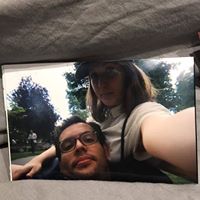-
Posts
35 -
Joined
-
Last visited
About littlepigeon
- Birthday October 13
Profile Information
-
Gender
Woman
-
Pronouns
she/her
-
Interests
special collections/rare books libraries; archives and records management; digital curation; manuscript studies (primarily pre-modern/medieval); museum studies
-
Program
MLIS, Fall 2023
littlepigeon's Achievements

Caffeinated (3/10)
25
Reputation
-
 bluemojav reacted to a post in a topic:
MLIS Fall 2023 Application Cycle
bluemojav reacted to a post in a topic:
MLIS Fall 2023 Application Cycle
-
 littlepigeon reacted to a post in a topic:
MLIS Fall 2023 Application Cycle
littlepigeon reacted to a post in a topic:
MLIS Fall 2023 Application Cycle
-

MLIS Fall 2023 Application Cycle
littlepigeon replied to littlepigeon's topic in Library Sciences Forum
I actually just accepted the offer from Syracuse last week! What about you? UIUC and UNC would both be great choices, and while I don't know anything about UCLA's program, I'm sure it would also be great. That's a tough call about the UIUC assistantship vs. UNC funding; everything I read online while working on my applications said just to go with the program that would ultimately cost you the least, but I feel like there are a few other factors I personally wanted to take into account when making the decision (which I realize I perhaps say from a place of privilege, in some ways).- 7 replies
-
- library science
- mlis
- (and 3 more)
-

MLIS Fall 2023 Application Cycle
littlepigeon replied to littlepigeon's topic in Library Sciences Forum
if you want to dm me, i'd be happy to answer any questions etc. you still have. the /r/LibraryScience subreddit is also a super helpful resource. in addition, the related subreddits /r/Librarians, /r/Libraries, and /r/Archivists are very informative and definitely at least worth perusing (although the last one will probably only seem useful if you're interested in specializing in archives/records etc.). while not as specifically geared toward being a student/prospective student of library science, they do offer great snapshots of many other aspects of having/pursuing a career in the field (state of the job market, etc.) that would for sure be helpful for you to browse around if you're still uncertain about whether or not LS might be a good fit for you.- 7 replies
-
- library science
- mlis
- (and 3 more)
-

MLIS Fall 2023 Application Cycle
littlepigeon replied to littlepigeon's topic in Library Sciences Forum
welp, you and i managed not to apply to any of the same programs, so i'm not sure how helpful my reply will be.... but for the sake of not letting this thread die before it had the chance to live... here's where i applied and the responses i've received so far (FWIW, i only applied to on-campus master's level programs) - Simmons --- accepted w/ guaranteed tuition scholarship - Syracuse --- accepted w/ guaranteed tuition scholarship + paid RA appointment - Indiana --- accepted w/no guaranteed funding - Pitt --- accepted w/ (relatively very small) guaranteed tuition scholarship - Tennessee --- accepted; notifications of funding are supposedly going out "in April" (presumably before the 15th? but who knows tbh) - Wisconsin-Madison --- no word yet (but their website says that notifications of funding will be sent out 3 weeks after admissions decisions) good luck to everyone who applied this year!! (NB: i'll admit that i probs jumped the gun in deciding to apply to Indiana--at more or less the last minute--without having reviewed carefully enough the program's info re: funding opportunities for master's students... as it turns out they apparently don't award any funding to "most" of their incoming MS students (but i'd be super curious to hear from anyone who's able to provide a more concrete picture of what that funding landscape actually looks like)- 7 replies
-
- library science
- mlis
- (and 3 more)
-
littlepigeon changed their profile photo
-
littlepigeon started following MLIS Fall 2023 Application Cycle
-
well, given that there's nothing in the Library Sciences Forum yet pertaining to Fall 2023 applications/admissions, i'm pretty skeptical of this thread becoming very active at this point. i suppose there's no harm in creating the topic anyway, though... sidebar: it has just occurred to me that people might not even use GC as a main platform for this kind of forum anymore.... in which case, salutations to the void? idk. just please oh please don't tell me that everyone's migrated over to using Facebook and/or Twitter for MLIS-related chatter. i'm not on either of those platforms, and just the thought of potentially "having" to join either one in order to participate in an MLIS forum is like probably the biggest bummer I can imagine honestly..... BUT i digress so will now likely proceed by just following the apparent template used in the previous years' iterations of this topic thread. (topic thread? is that a thing? i haven't been active in a forum since like 2015 and that one was in fact just another GradCafe one.... sooo feeling a bit like i don't know how to talk to people on the internet anymore? i'm sure that anyone who reads this definitely came for exactly this kind of ~relatable content~ though.) i think i'll do that in a new post, however, as i'd really rather avoid being the weird rando posting like fully the equivalent of a novella in a forum where no one asked for it and where it's also highly unlikely that more than like 7-9 people will ever read it....
- 7 replies
-
- library science
- mlis
- (and 3 more)
-
 littlepigeon reacted to a post in a topic:
Yes, it is all BS
littlepigeon reacted to a post in a topic:
Yes, it is all BS
-
 littlepigeon reacted to a post in a topic:
Yes, it is all BS
littlepigeon reacted to a post in a topic:
Yes, it is all BS
-
 littlepigeon reacted to a post in a topic:
Yes, it is all BS
littlepigeon reacted to a post in a topic:
Yes, it is all BS
-
 littlepigeon reacted to a post in a topic:
Yes, it is all BS
littlepigeon reacted to a post in a topic:
Yes, it is all BS
-
 Dr. Old Bill reacted to a post in a topic:
Fall 2015 Acceptances (!)
Dr. Old Bill reacted to a post in a topic:
Fall 2015 Acceptances (!)
-

Fall 2015 Acceptances (!)
littlepigeon replied to hreaðemus's topic in Literature, and Rhetoric and Composition
Same here! Not sure if I'm going to accept the offer, but I was super excited to get that voicemail. I admit I'm curious about why the status of my application is still "pending" online, but I'm not going to worry about that too much. -
 littlepigeon reacted to a post in a topic:
Fall 2015 Acceptances (!)
littlepigeon reacted to a post in a topic:
Fall 2015 Acceptances (!)
-
 Dr. Old Bill reacted to a post in a topic:
Taking time off after MA to apply for PhD
Dr. Old Bill reacted to a post in a topic:
Taking time off after MA to apply for PhD
-
 littlepigeon reacted to a post in a topic:
Fall 2015 Applicants
littlepigeon reacted to a post in a topic:
Fall 2015 Applicants
-
 littlepigeon reacted to a post in a topic:
Fall 2015 Applicants
littlepigeon reacted to a post in a topic:
Fall 2015 Applicants
-
I took two years off after getting my BA before starting my MA program, and have been taking the current year off (well, since August) to apply to Ph.D. programs. My MA program was only three quarters long, so it would have been impossible for me to apply to Ph.D. programs simultaneously. Regardless, though, I'll agree with everyone else's posts here; I don't think a break from your studies could at all hinder your chances of being accepted at most programs (and if they did reject you on that basis, you probably wouldn't want to enroll there anyway, right?).
-
 littlepigeon reacted to a post in a topic:
GRE English Lit (Sept/Oct 2014)
littlepigeon reacted to a post in a topic:
GRE English Lit (Sept/Oct 2014)
-
 Dr. Old Bill reacted to a post in a topic:
What constitutes a "good" GRE Subject Test score?
Dr. Old Bill reacted to a post in a topic:
What constitutes a "good" GRE Subject Test score?
-
 littlepigeon reacted to a post in a topic:
Hey, Medievalists... (Fall 2015)
littlepigeon reacted to a post in a topic:
Hey, Medievalists... (Fall 2015)
-

Hey, Medievalists... (Fall 2015)
littlepigeon replied to littlepigeon's topic in Literature, and Rhetoric and Composition
On a totally different note: I'm sheepishly going to post this question/observation about a current source of anxiety for me, despite the inevitability of me revealing myself as a medievalist n00b/the asthmatic kid trying to climb the fence and get to the baseball game but her shoelaces keep getting stuck in the fence wires... I'm curious to hear what all of you think about lit theory in relation to medieval lit/medieval studies. It has seemed to me that a few of the more popular/accepted schools of theory don't always apply as well to medieval lit as they do to some of the later periods, and while reading over the papers I submitted during my MA program last year, I've noticed that I tend to shy away from making theory-heavy arguments most of the time (that is, I might take a cultural or even new historicist stance, or sometimes even just produce a classic close reading that is focused more on the substance and context of the text itself than in trying to read it through any particular theoretical lens). Clearly, however, most of these adcomms appear to want to see that we know what scholars in our field are doing in terms of their theoretical work and how they're developing innovative approaches to studying medieval lit, and I'm beginning to feel like I have a lot of reading to do before I can confidently say I'm "up to date" with how current medievalists are incorporating theory into their methodologies in productive and interesting ways. My other problem is that I quite simply don't *love* a lot of the theoretical routes available at the moment; I've sustained a marginal interest in gender/sexuality studies, but even that can become a more frustrating than enjoyable approach, in my experience. Sigh. This isn't really a question yet. I guess I'm wondering how you all go about doing this type of broad research? I know I can just start reading recent essays and articles to see who's saying what about which thing, but any other advice you guys have about brushing up on my theory knowledge (specifically, what medievalists are doing in terms of their theoretical work) would be really, really appreciated. -
 unræd reacted to a post in a topic:
Hey, Medievalists... (Fall 2015)
unræd reacted to a post in a topic:
Hey, Medievalists... (Fall 2015)
-

Hey, Medievalists... (Fall 2015)
littlepigeon replied to littlepigeon's topic in Literature, and Rhetoric and Composition
Most people would say yes (if not definitely/absolutely/"I would've died without them," etc.). A few classmates of mine this summer who ended up doing pretty well in our courses relied on them. However, I personally have just never been able to make flashcards work for me in any class on any subject. But if they've worked for you in the past, by all means try them out. The best study method for me was just writing and rewriting (and rewriting and rewriting...) verb conjugations and noun/adjective declinations every day until my hand ached too much to keep going. With verbs, it becomes a more tedious task as you get further along in your course and know more and more forms (simply because each verb takes longer to conjugate fully), but getting into the habit of writing them all out really helped me retain the crazy amount of information I had to know in the short period of time I had (not my forte whatsoever--my short-term memory is embarrassing, honestly). Unfortunately, I have zero advice regarding learning/studying OE. I've encountered it in several courses over the years, and really love the language, but have never studied it formally or learned much about the grammar/morphology. I definitely want to take a few semesters of it once I'm (hopefully) in a program next year, and a few that I've looked at actually require 1-2 semesters in OE of all their Ph.D. students, regardless of specialization, which I think is pretty cool. Also, my face is red over having written "it's" instead of "its" in a previous post in this thread...I obviously need to start proofreading my TGC posts more carefully. *hides in corner for a week* -
 unræd reacted to a post in a topic:
Hey, Medievalists... (Fall 2015)
unræd reacted to a post in a topic:
Hey, Medievalists... (Fall 2015)
-
 hreaðemus reacted to a post in a topic:
Hey, Medievalists... (Fall 2015)
hreaðemus reacted to a post in a topic:
Hey, Medievalists... (Fall 2015)
-

Hey, Medievalists... (Fall 2015)
littlepigeon replied to littlepigeon's topic in Literature, and Rhetoric and Composition
Charts. Make so. Many. Charts. I've got two 1-subject notebooks from this summer that are just filled front to back with my study/practice charts and the notes I took in class, as well as pages where I just wrote out specific rules, etc. that I'd had trouble memorizing the first time around. Also, if you get stuck on any particular word, Wiktionary is surprisingly helpful (particularly for verbs). You can enter any conjugation of pretty much any verb (at least from the introductory vocab lists, which were all I was dealing with), and it will tell you what tense and person it's in, as well as link you to the main Wiktionary entry for that verb that has it's full meaning, etc. Same deal for nouns, adjectives, and the rest. I'm not sure how reliable it would be for more advanced Latin, but for an Intro course it was a quick and easy way to help my studying move a little faster. -
 Dr. Old Bill reacted to a post in a topic:
Fall 2015 Applicants
Dr. Old Bill reacted to a post in a topic:
Fall 2015 Applicants
-

Fall 2015 Applicants
littlepigeon replied to tingdeh's topic in Literature, and Rhetoric and Composition
I've evidently reached my quota for up-voting posts, so I'm giving this ten of my personal (super valuable) gold stars! -
 Dr. Old Bill reacted to a post in a topic:
Fall 2015 Applicants
Dr. Old Bill reacted to a post in a topic:
Fall 2015 Applicants
-
 Dr. Old Bill reacted to a post in a topic:
GRE English Lit (Sept/Oct 2014)
Dr. Old Bill reacted to a post in a topic:
GRE English Lit (Sept/Oct 2014)
-

GRE English Lit (Sept/Oct 2014)
littlepigeon replied to queennight's topic in Literature, and Rhetoric and Composition
ETS itself says that it's essentially impossible to make a perfect score on the Lit Subject test (unlike some of its other Subject tests). I've taken a few practice exams, which are extremely helpful, and my one piece of advice would be to make sure you're familiar (in THE most general sense) with lit crit. As in, there is ALWAYS (ok, maybe not always, but on every test I've taken there has been) a question that has blurb definitions of about five schools of lit theory, and you have to match the school to the definition. So basically, go on Wikipedia and memorize the first paragraph or two of the pages for Structuralism, Deconstruction, Post-Structuralism, New Criticism, New Historicism, etc. Other than that, the best advice I can think of is to focus on what you already know. I (shamefully) never took a single class in either Romanticism or Victorian lit while in undergrad or grad school, so I'm not going to waste a hundred thousand hours trying to figure out how to differentiate the poetry of Shelley, Wordsworth, and Byron (although unfortunately, in my experience, ETS loves their Romantics...). Instead, make sure you're as confident as possible about the periods you already know something substantial about. Finally, even if you aren't going to take a practice test, just read through as many of them as possible. Learning how ETS phrases its questions (and knowing what types of questions they usually ask) will give you a HUGE advantage come test day. -

Fall 2015 Applicants
littlepigeon replied to tingdeh's topic in Literature, and Rhetoric and Composition
Honestly, I probably won't send my subject score to the programs that don't require it unless it's absolutely incredible (like 85-90th percentile or, very hypothetically speaking, higher than that), since it's so freakin' expensive to send the damn things. -

Fall 2015 Applicants
littlepigeon replied to tingdeh's topic in Literature, and Rhetoric and Composition
I'm compelled to add that I've heard the exact opposite from a number of already-Ph.D.-student friends, as well as professors at both institutions I've attended. I think that this sort of claim can't really be a generalization about schools/programs across the board, but rather each individual department probably cares significantly more or less about the LoRs than others do. That being said, I think that if you have strong LoRs from respected scholars in the field you're trying to enter, they are especially helpful (this is why some programs specifically state that applicants ought to avoid having only non-tenured/adjunct/etc. professors write all their LoRs).



